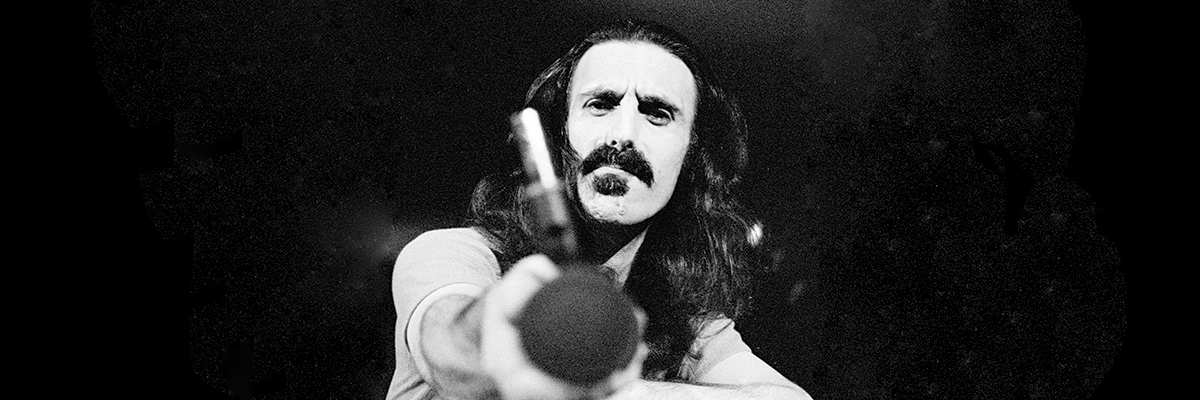It’s hard to believe that the talent and energy of Frank Zappa, a man who refused to be measured by any conventional standard, have been gone for 20 years. When I was lucky enough to meet him briefly in 1971, it would never have occurred to me that he would also be kind. By then he had released only a dozen of his 70-plus albums, any one of which could drive the guests from a party with its collision of styles and angry lyrics. He might target the news media’s lurid coverage of the race riots in Watts, or the violence for sale with Christmas toys, or the hypocrisy of a congressman’s affair with his teenage queen. But as often he’d directly scold his own audience: “You think we’re singing about someone else!”
Zappa was on tour with a newly re-formed Mothers of Invention, which brought them to a former skating-rink-turned- concert-venue in Kansas City, Mo.—the Cowtown Ballroom. It was my first concert. Desperately in need of some alternative to my high school culture, I wasn’t going to miss seeing Zappa.
When “Flo and Eddy” (who had quit the Turtles and joined the new Mothers) started singing “Happy Together,” I broke into tears that I couldn’t stop for the rest of the performance. After the concert, the crowd dispersed, but I remained standing, still crying, watching the roadies break down the equipment. No doubt I was conspicuous. Zappa saw me there and walked up, extending his hand in a business shake, and asked me what was wrong. I was so overwhelmed, all I could think to tell him was about my mother’s poodle— a dreadful animal with painted nails who would have panic attacks when the television was turned off (attacks that eventually killed her, though not yet). Zappa gave me his business card and told me to write him a letter about it. He offered me the best two words of advice I could have gotten: “Convert it.” I understood him to mean that I should change the way I saw circumstances I couldn’t change, convert them into something I could survive. Maybe that’s not what he meant at all, but at that moment, it helped.
Zappa’s early works always had an edge that made it difficult to tell if he was mocking or paying tribute to major musical figures of the ’60s. He scrambled together lines and sounds of Dylan, Donovan, the Beatles, and Hendrix, splicing in stoned dialog, the scratch sounds of a stereo needle, obscene lyrics recorded backwards, or perhaps some orchestral pieces by Holst or Stravinsky. The jacket notes for his double-album debut in 1966, called “Freak Out,” boasted that it had “no commercial potential,” with a song that even mocks his audience, “Maybe that’s not for me to say. They only pay me here to play.”
How ironic that Zappa’s distinctive face became an emblem of the counterculture when in truth he was one of its most insightful critics.
Within a year of the Beatles’ release of “Sgt. Pepper’s,” arguably the anthem for the late ’60s, Zappa released a prophetic satire of it and the culture it encouraged, called “We’re Only In It for the Money,” with the lyrics, “Every town must have a place where phony hippies meet, psychedelic dungeons popping up on every street.”
Zappa was the first person I heard warn that hippies would be shot by the police (two years before the Kent State shootings), that the movement would devolve into a shopping style, that “flower power” was only escapist laziness.
For all the self-critique Zappa brought to the counterculture, he also offered the best-reasoned defense of its constitutional right to self-expression. He printed the first amendment on the record sleeves of his earliest albums. In 1985, when Tipper Gore and the Parents Music Resource Center nudged the U.S. Senate to consider mandating content warnings on sexually explicit music, Zappa testified before Congress that the proposed censorship measure was “the equivalent of treating dandruff by decapitation.” “People who write bad laws,” he added, “are more dangerous than songwriters who celebrate sexuality.”
When his predictions about the counterculture came true, he apparently lost interest in significant satire and started singing nonsense lyrics about yellow snow, songs about farms that grow dental floss, even a song about a poodle. But if he lost his spirit for angry lyrics, he kept his energy for composing jazz, classical music, and that distinctive sound I can always recognize as his.
Frank Zappa died from prostate cancer 20 years ago on Dec. 4, 1993. Were they musical geniuses, too, satirists Jon Stewart and Stephen Colbert might be seen as his successors today, but they don’t come close to expressing the raw anger and frustration of today’s generation that Zappa did for us. Rest in peace, Frank Zappa, or maybe not.

